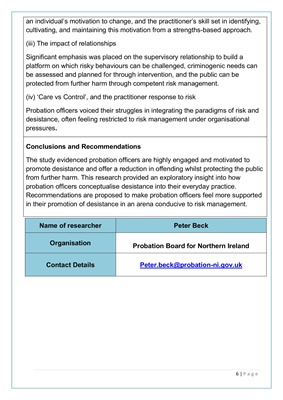
6 | P a g e
an individual's motivation to change, and the practitioner's skill set in identifying,
cultivating, and maintaining this motivation from a strengths-based approach.
(iii) The impact of relationships
Significant emphasis was placed on the supervisory relationship to build a
platform on which risky behaviours can be challenged, criminogenic needs can
be assessed and planned for through intervention, and the public can be
protected from further harm through competent risk management.
(iv) 'Care vs Control', and the practitioner response to risk
Probation officers voiced their struggles in integrating the paradigms of risk and
desistance, often feeling restricted to risk management under organisational
pressures.
Conclusions and Recommendations
The study evidenced probation officers are highly engaged and motivated to
promote desistance and offer a reduction in offending whilst protecting the public
from further harm. This research provided an exploratory insight into how
probation officers conceptualise desistance into their everyday practice.
Recommendations are proposed to make probation officers feel more supported
in their promotion of desistance in an arena conducive to risk management.
Name of researcher Peter Beck
Organisation Probation Board for Northern Ireland
Contact Details
peter.beck@probation-ni.gov.uk